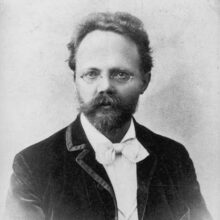 Englebert Humperdinck, perhaps surprisingly if you weren't already aware of it, lived well into the 20th Century: his dates are 1854 to 1921. I say it's surprising, because in my mind he's known as a 19th Century Wagnerite -a romantic nationalist, the existence of which practically defines 'late 19th Century'. Learning he lived through the First World War (during which he publicly supported Germany's military actions and goals) was thus a bit of a shock!
Englebert Humperdinck, perhaps surprisingly if you weren't already aware of it, lived well into the 20th Century: his dates are 1854 to 1921. I say it's surprising, because in my mind he's known as a 19th Century Wagnerite -a romantic nationalist, the existence of which practically defines 'late 19th Century'. Learning he lived through the First World War (during which he publicly supported Germany's military actions and goals) was thus a bit of a shock!
He was born in Siegburg, a small town in the west of Germany, near to Bonn and Cologne. He was to die sixty seven years later in Neustrelitz, in eastern Germany, just north of Berlin, having suffered a heart attack during a performance of Weber's Der Freischutz.
He was attempting to write operas aged just 14, despite parental pressure to become an architect. He was eventually allowed to study music at the Cologne Conservatory when he turned 18, spending four years doing so. In 1876, he went on to the Royal Music School in Munich for further studies, where he became a member of the local Wagner club: he was to meet his hero in Naples in March 1880.
Wagner was apparently as taken with Humperdinck as Humperdinck was with Wagner: he asked Humperdinck to assist him in preparing the first performance of Parsifal and Humperdinck accordingly spent most of 1881-2 at Wagner's home in Bayreuth, copying the score, helping out in countless minor ways -and even writing some scene-change music for Parsifal's third act.
He then seems somewhat to have fizzled out a bit: he became a teacher at his alma mater, the Cologne Conservatory; then music editor at Schotts music publishers; part-time opera critic of the Mainzer Tageblatt newspaper; then teacher at the Frankfurt am Main's Hoch Conservatory; music critic for the Frankfurter Zeitung... and so on. One minor post after another, in fact... until in 1890 he began writing his magnum opus, the opera Hänsel und Gretel. This took three years to complete and received its first performance in Weimar, in December 1893: the premiere was conducted by one Richard Strauss. It was an instant success and received performances in more than 50 theaters within its first year. Its success was instrumental in getting the Kaiser to appoint him a music professor, after which he took up various music teaching posts of some distinction. It is said that he applied to be director of the Sydney Conservatorium in Australia, but the outbreak of World War I scuppered any prospect of that happening. His professional life was severely curtailed in any case after 1912 as a result of suffering a severe stroke that paralyzed his left hand.
Hänsel und Gretel remains the one work that is indelibly associated with him, and its fairy-tale nature, and his ability to combine German folk melodies and rhythms with Wagnerian 'through-compositional' techniques was innovative and revelatory. Its success was no doubt also down to the distinctly nationalistic flavour of the opera: the incorporation of folk elements within it matches the broader trend in late Romantic music, whereby composers sought to connect with their cultural roots and traditions.
Though Humperdinck wrote several other vocal and dramatic works, as well as incidental music for assorted Shakespeare plays, that one opera pretty much defines him and his output. It is not entirely fair, therefore, to call him a one-hit wonder, but it's a close-run thing!
Music Plays from my collection
(since January 9th 2021)
| Date of Play | Time of Play | Genre | Composition | Length | Play Count |
|---|---|---|---|---|---|
| Date of Play | Time of Play | Genre | Composition | Length | Play Count |